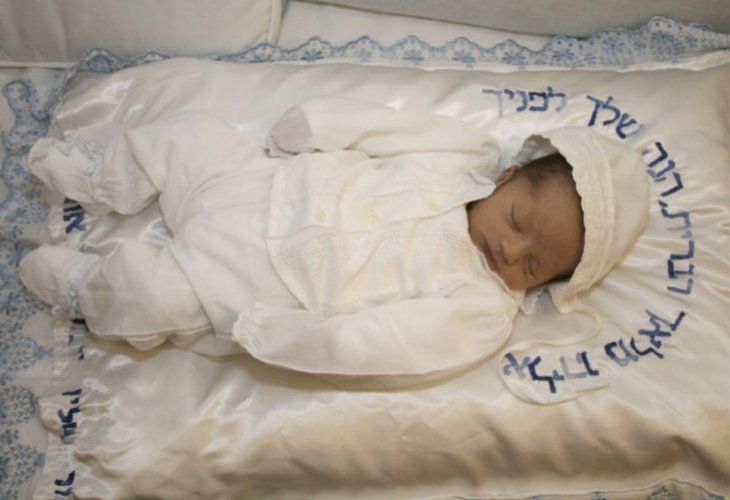Personal Stories
A Jewish Child's First Step Toward Tradition: A Mohel's Powerful Story
A mohel's unforgettable experience with a Jewish child's brit milah sparks his desire for Torah and Shabbat.
 (Illustrative photo: Flash 90)
(Illustrative photo: Flash 90)The process of conversion for anyone wishing to join the Jewish people is a deeply meaningful one. It involves accepting the commandments (the mitzvot), which is the foundation of conversion, and also includes two key rituals: circumcision and immersion in a mikveh (ritual bath). As Maimonides writes, based on teachings in the Talmud, the first conversion took place when the entire nation of Israel accepted the Torah and entered into the covenant at Mount Sinai. Through this, the Jewish people became the chosen nation.
Circumcision (brit milah) plays a central role in Jewish identity. According to Jewish teachings, the circumcision of the body reflects the inner spiritual work required to open our hearts to God. In this sense, circumcision is not just a physical act—it’s also a symbol of removing the "foreskin" of the heart, a metaphor for clearing away the obstacles to receiving Torah and spiritual growth. Without circumcision, it is said that a person’s heart remains blocked from fully embracing the teachings of the Torah.
This concept is beautifully illustrated in a powerful and emotional story shared by Rabbi Abouhav, a well-known mohel (ritual circumciser) from Tel Aviv, which perfectly expresses the meaning of a child’s brit milah and the impact it has on both the child and the Jewish community.
One day, Rabbi Abouhav received a phone call:
"Hello?" a woman’s voice asked.
"Hello, blessings to you," he answered.
"Is this Mohel Abouhav?" she asked.
"Yes, it is. Who is calling?"
"I'm calling to see if you're available tomorrow for a circumcision. It's in Holon, at 7:30 in the morning."
"Of course," he replied.
The conversation seemed a bit strange, but he wrote down the details and prepared for the next day. The next morning, he left after morning prayers and took a taxi to the address. When he arrived, he was surprised to find it wasn’t a synagogue or reception hall—it was a private home in a nice neighborhood with a sign on the door that said, "Golan Family."
He knocked gently on the door, and the woman who opened it apologized. "Sorry, I’m really late. My husband just left, but don’t worry—the nanny will be here soon to take over with Yuvali."
"Yuvali?" Rabbi Abouhav asked, surprised.
"Yes, Yuvali is the baby you're going to circumcise," she explained.
"Did you already name him?"
"Yes, we did. But honestly, we weren't really connected to Jewish customs, and we didn't even want a brit milah. But in the end, my husband and I decided it might be worth it."
"Wait a minute," said Rabbi Abouhav, "this isn't how a brit milah is done! Where is the father? Where is the minyan (a group of ten Jewish men needed for a proper prayer service)?"
"I'm really late," the woman replied. "Please, just start the circumcision. We’re in a hurry."
Rabbi Abouhav entered the baby’s room and set up his tools. As he looked down at the sleeping baby, a rush of emotion hit him. He couldn’t believe this was how a Jewish child was entering the covenant of Abraham. Hot tears flowed down his face.
He gently woke the baby, and as the sandak (the person who holds the baby during the brit milah), the mohel, and even as a father figure in that moment, Rabbi Abouhav circumcised little Yuvali.
Afterward, he sat with the baby in his arms, crying for him, for the pain of exile, and for the distance many Jews feel from their roots. He cried for this child’s future, not knowing what kind of education or guidance he would receive. He cried because of how many Jews in Israel had lost their connection to their faith and heritage. He also cried because it reminded him how important it is to judge our distant brothers favorably.
Half an hour later, the nanny arrived and apologized for being late. She walked into the room, saw Rabbi Abouhav sitting there, and asked, "Who are you?"
"I am Mohel Abouhav," he replied.
"Oh right, I remember now. Mrs. Golan mentioned that Yuvali was having a small surgery today. How is he?"
"He’ll be fine," said Rabbi Abouhav, his voice still shaking. "I need to go now," and he left the house quickly.
That day, he shared the story with his family, and over time, it faded from his memory.
But 12 years later, the Golan family came to Rabbi Abouhav's office at the Tel Aviv Rabbinate. A woman and her son walked in. They looked non-observant, but it wasn’t unusual for Rabbi Abouhav to see such families.
"Are you Mohel Rabbi Abouhav?" asked the woman.
"Yes, who are you?" he replied.
"I’m Mrs. Golan from Holon. Do you remember me?"
Suddenly, it all came rushing back. How could he forget that brit milah?
Yuvali, now a tall, handsome young man, was standing before him.
"How can I help you?" Rabbi Abouhav asked.
"My son insists on meeting you," the woman said. "We don’t know what to do, so I brought him to you."
Yuvali turned to Rabbi Abouhav and said, "I want tefillin (phylacteries), I want Shabbat (the Jewish Sabbath), and most of all, I want to learn Torah."
Rabbi Abouhav hugged him, kissed him, and encouraged him. "What’s the problem?"
Yuvali said, "My parents!"
Rabbi Abouhav called his mother. "Your son has no problem. He just wants to learn Torah."
"I know," she replied. "We’ve seen psychologists, but nothing has worked. They all said we should do what’s best for him. Can you teach him Torah?"
And Rabbi Abouhav cried again—this time, from joy.
He realized that when he cried over Yuvali's brit milah all those years ago, he wasn't alone. Surely, Elijah the Prophet, was crying alongside him. Rabbi Abouhav concluded, "Blessed is He who listens to prayers."

